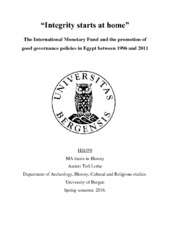"Integrity starts at home". The International Monetary Fund and the promotion of good governance policies in Egypt between 1996 and 2011
Master thesis
Permanent lenke
https://hdl.handle.net/1956/12124Utgivelsesdato
2016-05-17Metadata
Vis full innførselSammendrag
In 1996, the International Monetary Fund introduced its polices of good governance in order to rebrand the organization as an institution that promoted new policy practices such as financial integrity, transparency and anti-corruption. The same year, the IMF and Egypt agreed upon a Stand-By Arrangement that paved the way for massive liberalization and deregulation reforms, which were introduced over the following 14 years. Consequently, Egypt became one of the Fund's closest collaborators and associated IMF member countries in the Middle East. However, while Egypt made very considerable progress with job creation, budget deficit reduction and increased foreign direct investment, the country remained highly corrupt and poorly governed. The way Egypt was governed was indeed in sharp contrast to the IMF's good governance standards. Poor governance - including corruption, cronyism, social inequality and democratic restrictions - eventually led to the downfall of President Hosni Mubarak in January 2011. President Mubarak and his associates had agreed with many of the economic policy measures the Fund had suggested between 1996 and 2011, with the IMF praising the country's willingness to adjust through Executive Board discussions, economic reports and research. Why did the IMF remain so positive to the developments in Egypt when the country was so poorly governed, and what role did good governance really play it the relationship between Egypt and the IMF during this period? This thesis will discuss these subjects by analyzing how the IMF promoted its good governance policy practices towards Egypt between 1996 and 2011. If the Fund failed to promote good governance towards Egypt, was this failure a result of the IMF lacking data or were the Egyptian authorities unwilling to comply with IMF-suggested policy measures? This thesis will look into these subjects and attempt to understand how, and to what extent, the IMF's good governance polices were promoted towards Egypt between 1996 and 2011.
